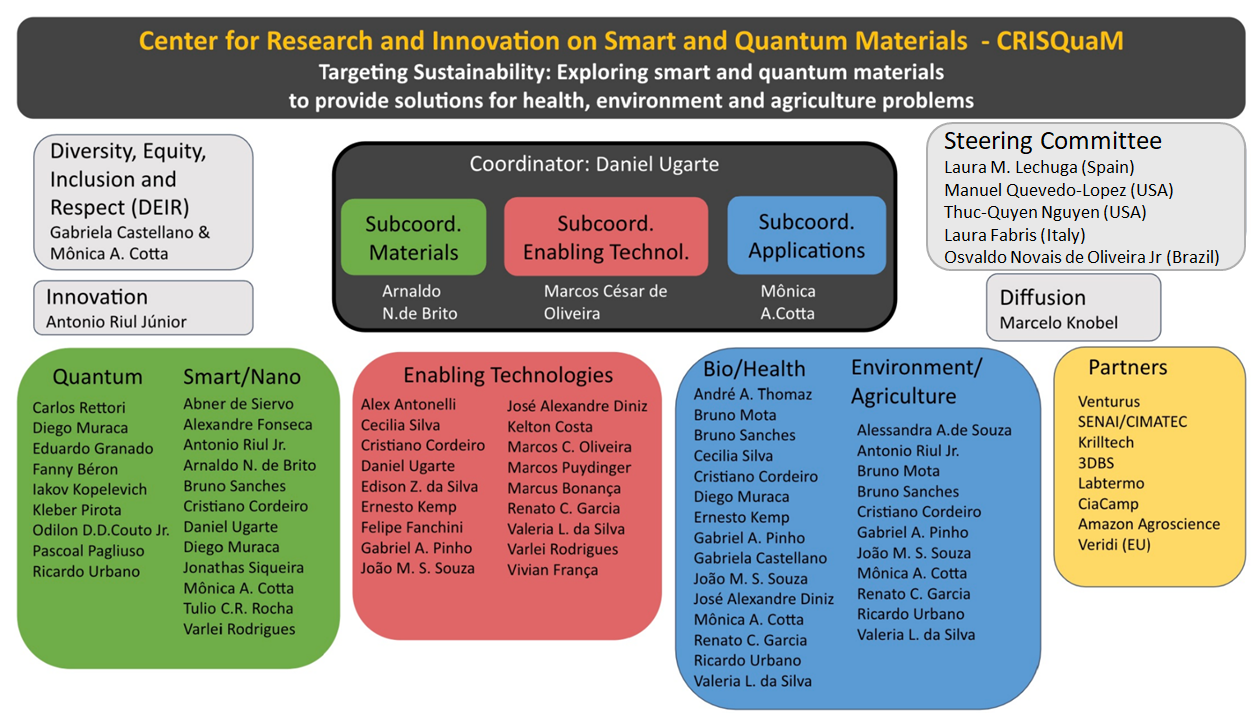BV-FAPESP: research projects supported in this Center
CRISQuaM in the Media: news about the center
CRISQuaM aims to explore the synergistic development of fundamental and applied science to create new materials with high potential for the construction of devices and sensors to address technological challenges related to sustainability, climate change, precision agriculture, ecology, and health. To achieve these goals, we have assembled an interdisciplinary and collaborative research team, integrating expertise across various scientific domains, researching novel materials with high innovation potential. By combining original synthesis methods, advanced characterization techniques, theoretical approaches, computational simulations, quantum technologies, and device construction designs, we aim to drive advances in smart and quantum materials, promoting scientific excellence and technological development. With this, we plan disruptive innovations in instrumentation—including hardware and AI-based tools—as well as in quantum technologies, biomedical devices, and signal processing, in addition to plant bionics, exploring plant-pathogen interactions. Besides research activities, we plan intensive actions in education, dissemination, and communication for the general public, as a modern society should be aware of the challenges humanity faces and how research and technology are essential for responsibly utilizing the planet's limited resources. CRISQuaM's Innovation activities are accelerated through partnerships with several companies in related technologies, many of them Brazilian. Finally, all activities of the Center are managed in accordance with diversity, equity, and inclusion goals and best practices.
The Center brings together scientists, engineers, and innovators in a collaborative effort to apply materials science and quantum technologies at the cutting edge, designing new materials and nano(bio)sensors for advanced diagnostics. The Center has a team capable of producing a wide range of (nano/micro) materials, along with precise chemical and physical characterizations using modern techniques (synchrotron, advanced microscopy, magnetotransport, magnetic resonance, optics, etc.). In addition, the team offers various options in enabling technologies, including miniaturization, processing, and additive manufacturing, as well as instrumentation, quantum sensing, and electronics development. Data analysis will employ updated approaches (numerical simulation, classical and quantum machine learning, and quantum optimization). Applications at the knowledge frontier will address urgent sustainability needs in environmental areas, precision agriculture, plant bionics, and biomedical interfaces, contributing to the development of local technologies in close partnership with the Brazilian industry.
The organization of the Center is based on three pillars — Materials, Enabling Technologies, and Applications — together with partner companies, as described in the figure below.

2024-04-10
Sodium niobate is a type of ceramic with properties of interest to green chemistry; scientists from the Center for the Development of Functional Materials and collaborators have developed a new strategy for obtaining it.
2024-04-10
The new member of the Pasteur Network, which comprises 33 laboratories in 25 countries, is being equipped with the support of FAPESP, which is also funding several young researchers associated with the institute.
2024-04-10
An agreement to this end was signed in Belém in the Brazilian Amazon during the visit of French President Emmanuel Macron and Laurent Linguet, President of the University of French Guiana. The aim is to foster international cooperation that furthers the development of the Amazon region.
2024-04-10
In Brazil, researchers analyzed data for 8,384 clinical appointments that took place in a two-year period at Hospital de Base in São José do Rio Preto (São Paulo state) and found the situation to be similar to those in publicly-funded psychiatric outpatient clinics elsewhere in the country. The results, reported in Frontiers in Psychiatry, list the most common mental health problems and most frequently prescribed drugs.
2024-04-10
The researchers trained computer vision models to identify Brazilian mammals must susceptible to roadkill in real time and are partnering with toll road operators to test the system in real-world situations.
2024-04-10
Brazilian researchers analyzed more than 200 articles on the subject and identified the types of training most indicated for these cases. Their findings are reported in the journal Psychiatry Research.